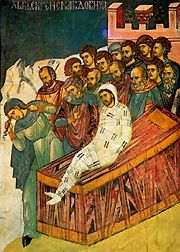10th Trinity III
Luke 7:11-17
And
it came to pass that on the next day, Jesus went into a city called Nain, and
Pierre Bouillon
his disciples and a large crowd went along with him. And as he drew near the
gate of the city, they became aware that a dead man was being carried out—the
only born son of his mother, and she was a widow. And a large crowd of people
from the city accompanied her.
And seeing her, the Lord felt her suffering and said to her, "Weep no more."
And approaching, he touched the coffin, and pallbearers stood still. He said, "Young man, I say to you, arise!"
The dead man sat up and began to speak. And Jesus gave him to his mother. Astonishment and awe seized all who were standing there, and they began to praise God and to glorify what was here revealed, saying, "A prophet powerful in spirit has been raised among us, and God has come down to us, his people."
Word about him spread out into all of Judea and all of the neighboring regions.
10th August Trinity
September 25, 2022
Luke 7:11–17
The Sunday Service for the Children speaks of Him who leads the living into the realm of death so that they may live anew. But it is not enough to simply come back to life again. It does not explain the real purpose behind the great cycling of life and death. That purpose is given in the next line of the children’s service: Christ leads what is dead into the realm of life so that it may behold, see, and grasp the Spirit of God itself.
The
funeral service speaks of the realm of the boundless, timeless world. This
realm is filled with the power of God’s forward-streaming will. When we die,
this
power of God’s will weaves together with the willing of our human soul.
This weaving, knitting together of Christ’s will and human will creates an eye,
an ocular in the soul. In the realm of death, this eye opens to behold Him,
shining powerfully in the light realm of the Spirit.
The widow’s son had been someone whose will had striven mightily toward beholding God. In the man’s visit to the realm of death, Christ’s creating will opened the widow’s son’s soul eye. And what he saw when his eye was opened was an opening between the realm of earth and the realm of the Spirit. And across that opening was a bridge between the realm of the living and the realm of the so-called dead. That bridge is Christ himself.
Through Christ, we enter the realm of death. Through his power in our thoughts and hearts, we pass through time into the unbounded realm of timelessness. Through Christ, we are reborn within the realm of death. Through him, our soul’s eye no longer weeps but sees.



















